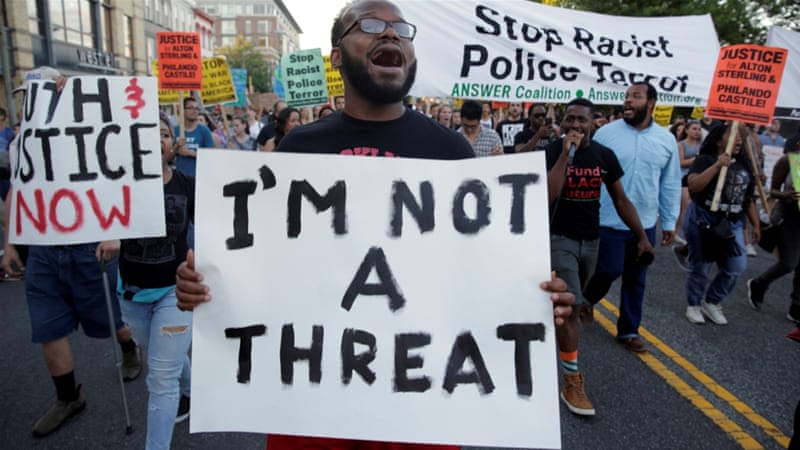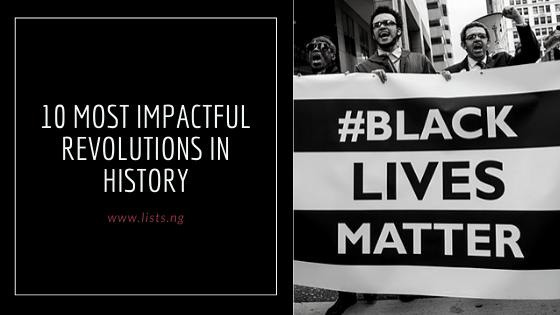Revolutions and movements have been a part of the world since time immemorial, they usually originate from the need to stand up against oppression, implement social, and transform the world in general.
For the past few weeks, following the killing of George Floyd by a white policemen, the world has stood in solidarity with the the #BlackLiveMatter movement. Several marches and protests have been staged all around the world in countries like France and the United Kingdom, and social media has also played an important part in raising awareness for this profound movement. The movement continues to grow into one of the biggest in recent history and isn’t likely to stop until justice is carried out and change is implemented.
Below are other revolutions that have had significant impacts in world history.
1. Black Lives Matter

#BlackLivesMatter was sparked by George Zimmerman’s acquittal of the murder of teen Trayvon Martin on July 13, 2013. It soon became an international human rights movement that campaigns against violence and systemic racism towards black people. It has also become a symbol of the fight against racial profiling and police brutality directed toward African-Americans in the United States. The Black Lives Matter movement has led to numerous protests, with the 2020 movement being the most far-reaching and most impactful.
2. French Revolution
Inspired by liberal and radical ideas, such as natural rights and equality before the law, the French Revolution is regarded as one of the most important events in human history. The bloody and far-reaching social and political upheaval began in 1789 and ended in 1799. The Revolution overthrew the monarchy, established a republic, and finally ushered in the rule of Napoleon. The French Revolution went on to impact the course of modern history, spreading Enlightenment principles and influencing the decline of absolute monarchies while replacing them with republics and liberal democracies.
3. Arab Spring
The Arab Spring was a series of anti-government protests, uprisings, and armed rebellions that spread across much of the Arab world in the early 2010s. It began in Tunisia and was fuelled by hopelessness which came as a result of oppressive regimes and a low standard of living. As social media spread the protests, other Arab countries soon such as Libya, Egypt, Yemen, Syria and Bahrain, soon joined. The revolution saw the deposition of rulers such as Zine El Abidine Ben Ali, Muammar Gaddafi, Hosni Mubarak, and Ali Abdullah Saleh.
4. Occupy Wall Street
Occupy Wall Street was a protest movement against economic inequality that began in Zuccotti Park, located in New York City’s Wall Street financial district, in September 2011. The movement was inspired by the Arab Spring demonstrations and was aimed against capitalist abuses, the growing wealth gap, and the control of the world’s resources by the richest 1% of the population. The protests popularised the slogan “We are the 99%.” and gave rise to the wider Occupy movement in the United States and other countries.
5. Bolshevik Revolution
The Russian Revolution which began in 1917 and ended in 1923, marked the end of Russia’s imperial era. This period of political and social revolution across the territory of the Russian Empire,which stemmed from frustrations of the proletariat saw the overthrow of the Tsar Nicholas II monarchy by Bolsheviks, led by Vladimir Lenin, and the establishment of the Soviet Union at the end of the Civil War.
6. The Fall of the Berlin Wall
The Berlin Wall was a guarded concrete barrier that physically and ideologically divided Berlin from 1961 to 1989. The Wall cut off West Berlin from surrounding East Germany, including East Berlin. Several social movements against the USSR’s hold on Eastern Bloc states, such as Poland, Hungary, and the GDR emerged in 1989 around when the wall was collapsed . The subsequent fall of the Berlin Wall represented the end of communist regimes in Europe.
7. Athenian Revolution
Athens is regarded as the birthplace of democracy, even though it was only open to free male citizens. The idea of democracy came about from the Athenian Revolution of the 8th century BCEwhich overthrew the ruling aristocratic oligarchy and established the almost century-long self-governance of Athens in the form of a participatory democracy.
8. Stonewall riots
The Stonewall riots were a series of spontaneous, violent demonstrations by members of the gay community in response to a police raid that began in the early morning hours of June 28, 1969, at the Stonewall Inn in the Greenwich Village neighborhood of Manhattan, New York City. The riots marked the beginning of efforts to win equal rights for sexually and gender diverse people in the United States.
9. Cuban Revolution
The Cuban Revolution was a revolt which began on 26th of July 1953 and conducted by Fidel Castro against the military dictatorship of Cuban President Fulgencio Batista.Batista was a corrupt dictator allied to the American government, which arranged for his political opponents to be either arrested or condemned to exile. Fidel Castro and his brother Raúl, met revolutionary fighter Ernesto “Che” Guevara while in exile. Upon their return, they started a guerrilla war that lasted until Castro took power on January 8, 1959. Castro nationalised several sectors of the Cuban economy and established a communist regime that cut ties with the United States during the height of the Cold War.
10. Iranian Revolution
The Iranian Revolution was a series of events that culminated in the overthrow of the United States supported Pahlavi dynasty under Shah Mohammad Reza Pahlavi, and the subsequent replacement of his government with an Islamic republic under the Grand Ayatollah Ruhollah Khomeini one of the leaders in the revolt. Ayatollah Khomeni”s regime implemented several changes, including the installation of an anti-imperialist nationalism.



